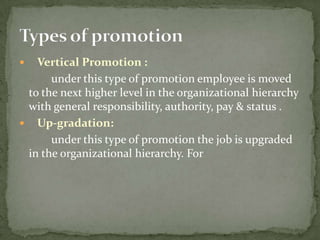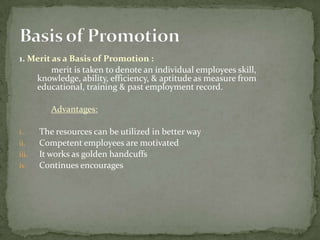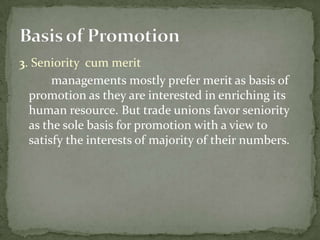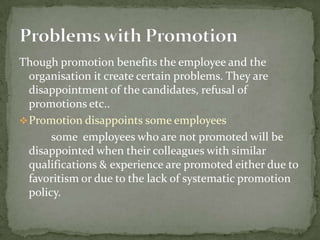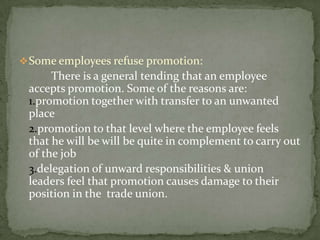Promotion
- 1. Promotion
- 2. According to Paul Pigons & Charles A Myers “ promotion is advancement of an employee to a better job, better in terms of greater responsibility, more prestige or status, greater skill & especially increased rate of pay or salary” Arun Monappd & Miraza Saiyadin define promotion as a “ the upward reassignment of an individual in an organization's hierarchy, accompanied by increased in an responsibilities, enhanced status as usually with increase income though not always so “
- 3. ÔÇó Vertical Promotion : under this type of promotion employee is moved to the next higher level in the organizational hierarchy with general responsibility, authority, pay & status . ÔÇó Up-gradation: under this type of promotion the job is upgraded in the organizational hierarchy. For
- 4. ÔÇó Dry Promotion : under this promotion, the employee is moved to the next higher level in the organizational hierarchy with greater responsibility, authority and status without any increase in salary
- 5. Organisations promote the employees with a view to achieve the following purposes: 1) To utilise the employees skill, knowledge. 2) To develop competitive spirit & inculcate the zeal. 3) To develop competent internal source of employees 4) To promote employees self development. 5) To promote a feeling of the employee 6) To promote interest. 7) To build loyalty 8) To reward 9) To get rid of the problems created by employee.
- 6. 1. Merit as a Basis of Promotion : merit is taken to denote an individual employees skill, knowledge, ability, efficiency, & aptitude as measure from educational, training & past employment record. Advantages: i. The resources can be utilized in better way ii. Competent employees are motivated iii. It works as golden handcuffs iv. Continues encourages
- 7. 2. Seniority as a basis of promotion: seniority refers to relative length of service in the same job & in the same organisation. Advantages i. It is relatively easy to measure the length of service & judge the seniority. ii. There would be full support of the trade union to this system iii. It gives a sense of certainty of getting promotion to every employee iv. Senior employees will have satisfaction v. It minimise the scope for grievance & conflicts regarding promotion
- 8. 3. Seniority cum merit managements mostly prefer merit as basis of promotion as they are interested in enriching its human resource. But trade unions favor seniority as the sole basis for promotion with a view to satisfy the interests of majority of their numbers.
- 9. Promotion of employees from lower ranks to higher positions benefits the organization as well as employees 1. Promotion places the employees in a position where on employee’s skills and knowledge can be better utilised 2. It crates & increases the interest of other employees in company 3. It creates among employees a feeling of content with the existing conditions of works & employment 4. It increase interest in acquiring higher qualification in training & in self development 5. Promotion improves employee morale & job satisfaction 6. Ultimately it improves organisational health
- 10. Though promotion benefits the employee and the organisation it create certain problems. They are disappointment of the candidates, refusal of promotions etc.. Promotion disappoints some employees some employees who are not promoted will be disappointed when their colleagues with similar qualifications & experience are promoted either due to favoritism or due to the lack of systematic promotion policy.
- 11. Some employees refuse promotion: There is a general tending that an employee accepts promotion. Some of the reasons are: 1.promotion together with transfer to an unwanted place 2.promotion to that level where the employee feels that he will be will be quite in complement to carry out of the job 3.delegation of unward responsibilities & union leaders feel that promotion causes damage to their position in the trade union.
- 12. Every organisation has to specify clearly its policy regarding promotion based on its corporate policy. ÔÉò The policy should be applied uniformly to all employees ÔÉò It should be fair and impartial ÔÉò Systematic line of promotion channel should be incorporated ÔÉò It should ensure open policy ÔÉò It should contain clear cut norms & criteria for judging merit , length of service, potentiality etc ÔÉò Appreciate authority should be entrusted with the task of making a final decision
- 13. Thank you



